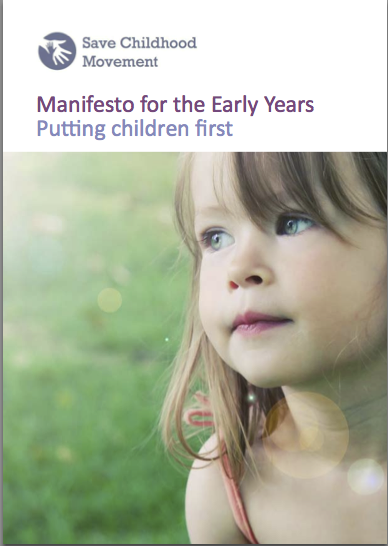Nachrichtenbeitrag
Early childhood movement challenges early years policymaking
LONDON (NNA) – An organisation which campaigns to stop the erosion of the rights and freedoms of children has expressed its concern that the best interests of children are not currently adequately catered for in early years education policymaking in England.
Across the political spectrum there was now consensus that early years provision was important for children's development and for helping parents – especially mums – into work, the Save Chilhood Movement says. But the question of “what is best” for young children was a point of huge contention among researchers, policymakers, commentators and politicians – not to mention parents.
In its Manifesto for the Early Years – Putting Children First, the organisation highlights the importance of developmental readiness and the dangers of pushing through universal childcare without the appropriate evidence base. It calls for significant investment in improving the current quality of provision as well as a much stronger focus on relationships and the importance of family life.
“With this manifesto we are arguing that the best needs of the child should be at the heart of all future policymaking, that we need to acknowledge and better support the vital importance of family and community life and that there needs to be a national debate about the values that we wish to see nurtured in larger society,” Save Childhood Movement’s chief executive, Wendy Ellyatt said.
Ellyatt added that the organisation was currently very concerned that universal childcare provision was being pushed through in England without due attention to the vital quality of care that includes developmentally appropriate environments, greatly improved parental support and engagement and the training and empowerment of a skilled workforce.
“One of the key aims of any Early Childhood Education and Care System (ECEC) is to allow every child to flourish and to achieve his or her full potential and we feel there is a real danger that without the necessary quality controls English children will be greatly disadvantaged,” she said.
The manifesto sets out the three key elements that should to be taken into account for the development of an appropriate ECEC: (1) an integrated, holistic and appropriately financed system (2) built upon an evidence-based understanding of the child as (3) a citizen with developmental rights and freedoms.
The manifesto, published at the end of March, comes at a time when the UK government is pushing for more teacher-led sessions in nurseries with a greater emphasis on formal and structured learning. A report by the schools inspectorate, the Office for Standards in Education (Ofsted), published at the beginning of April, argues that too many nurseries are failing to prepare children adequately “to stop them falling behind when they reach school age”.
“What children facing serious disadvantage need is high-quality, early education from the age of two delivered by skilled practitioners, led by a teacher, in a setting that parents can recognise and access. These already exist. They are called schools,” the chief inspector, Sir Michael Wilshaw, said at the launch of the report.
The Ofsted report came in for immediate criticism from a number of nursery and early years associations as being misguided.
In a wider context, the Save Childhood Movement expresses its concern that “politicians, policymakers and the key inspectorate” were all currently demonstrating a “worrying lack of understanding” about child development and a “deeply concerning neglect and dismissal of expert opinion and evidence”. All parties were now focusing on the economic benefits of affordable childcare but without the appropriate concern about the quality of provision and impact on child and family wellbeing.
There was a lack of focus on integrated provision and services targeted to local need and a lack of funding to ensure quality training and an appropriately valued and remunerated workforce. Parental choice was being neglected and undermined
The changes the organisation is calling for include evidence-based policymaking fully supported by the sector, much greater focus on the importance of nurture and high quality provision that is responsive to the needs of local communities. There was also a need for a valued and appropriately remunerated workforce, greatly improved parental support and a reversal of the funding curve to prioritise the early years as well as policymaking that is in line with the UN Convention on the Rights of the Child.
END/nna/cva
Item: 140422-04EN Date: 22 April 2014
Copyright 2014 News Network Anthroposophy Limited. All rights reserved.

